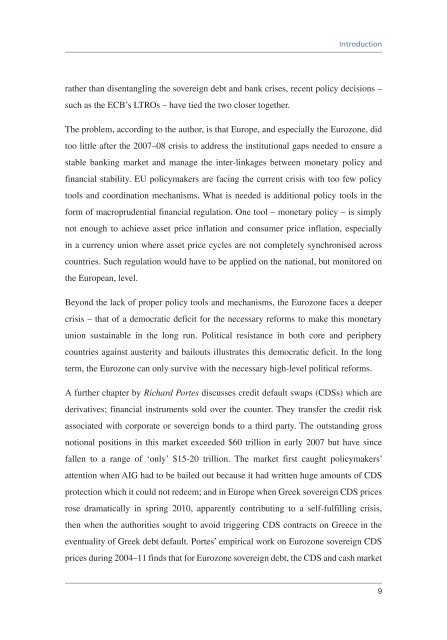Download PDF - Vox
Download PDF - Vox
Download PDF - Vox
- No tags were found...
Create successful ePaper yourself
Turn your PDF publications into a flip-book with our unique Google optimized e-Paper software.
Introductionrather than disentangling the sovereign debt and bank crises, recent policy decisions –such as the ECB’s LTROs – have tied the two closer together.The problem, according to the author, is that Europe, and especially the Eurozone, didtoo little after the 2007–08 crisis to address the institutional gaps needed to ensure astable banking market and manage the inter-linkages between monetary policy andfinancial stability. EU policymakers are facing the current crisis with too few policytools and coordination mechanisms. What is needed is additional policy tools in theform of macroprudential financial regulation. One tool – monetary policy – is simplynot enough to achieve asset price inflation and consumer price inflation, especiallyin a currency union where asset price cycles are not completely synchronised acrosscountries. Such regulation would have to be applied on the national, but monitored onthe European, level.Beyond the lack of proper policy tools and mechanisms, the Eurozone faces a deepercrisis – that of a democratic deficit for the necessary reforms to make this monetaryunion sustainable in the long run. Political resistance in both core and peripherycountries against austerity and bailouts illustrates this democratic deficit. In the longterm, the Eurozone can only survive with the necessary high-level political reforms.A further chapter by Richard Portes discusses credit default swaps (CDSs) which arederivatives; financial instruments sold over the counter. They transfer the credit riskassociated with corporate or sovereign bonds to a third party. The outstanding grossnotional positions in this market exceeded $60 trillion in early 2007 but have sincefallen to a range of ‘only’ $15-20 trillion. The market first caught policymakers’attention when AIG had to be bailed out because it had written huge amounts of CDSprotection which it could not redeem; and in Europe when Greek sovereign CDS pricesrose dramatically in spring 2010, apparently contributing to a self-fulfilling crisis,then when the authorities sought to avoid triggering CDS contracts on Greece in theeventuality of Greek debt default. Portes’ empirical work on Eurozone sovereign CDSprices during 2004–11 finds that for Eurozone sovereign debt, the CDS and cash market9














